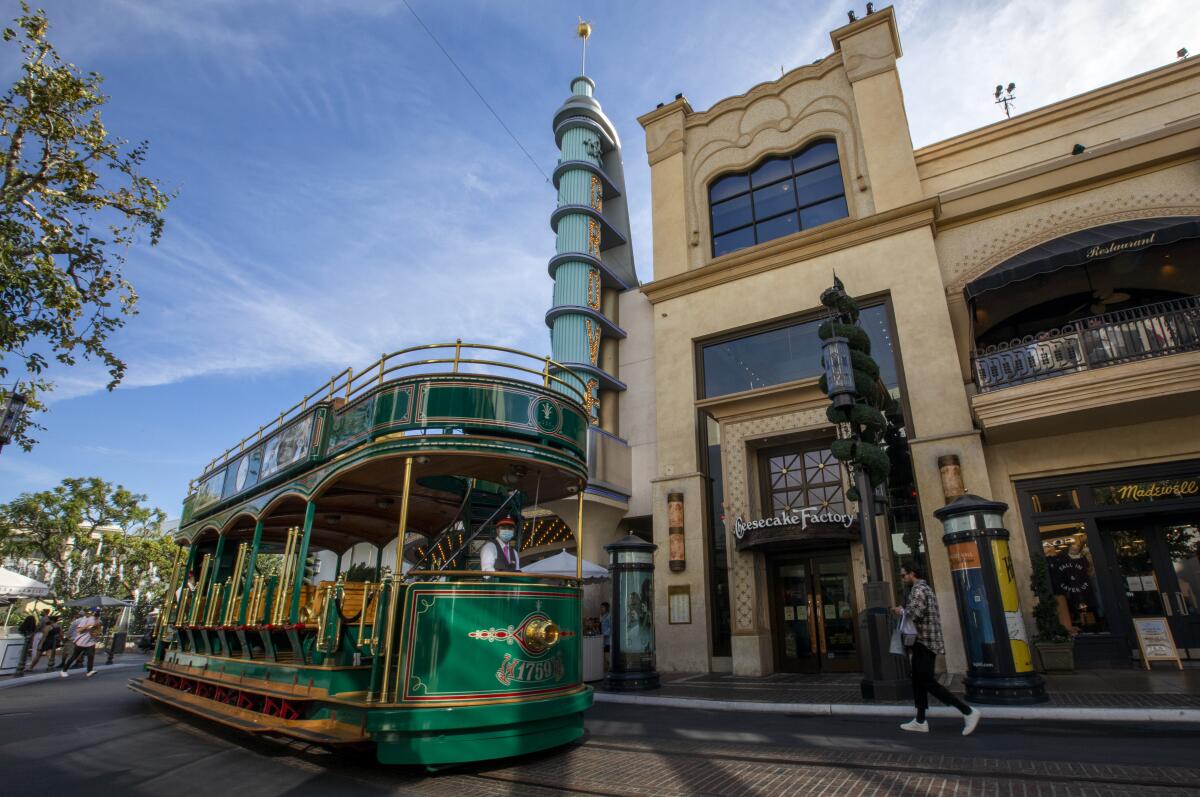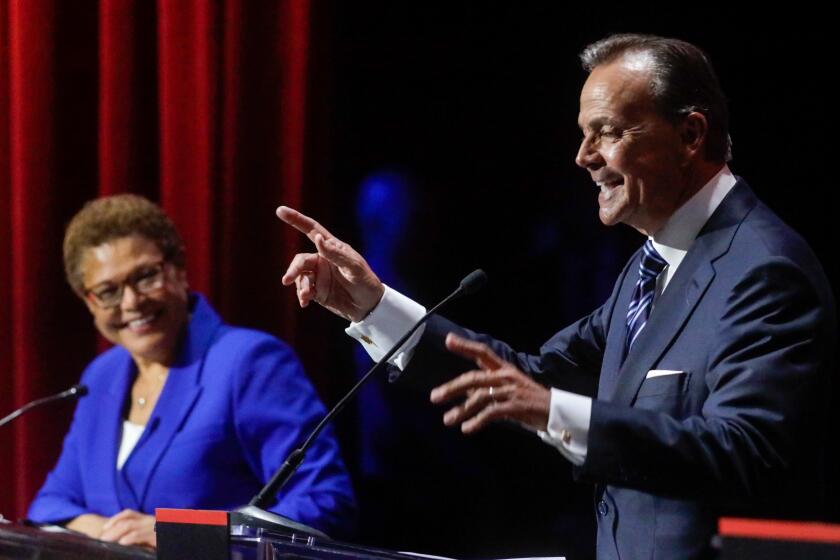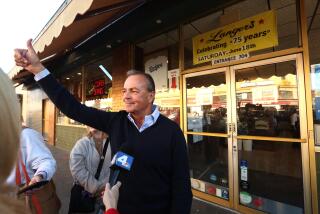Dear Rick Caruso: Running the city isn’t as easy as running the Grove

- Share via
I had three topics I wanted to discuss with Rick Caruso about his run for mayor of Los Angeles, but we kept getting interrupted.
The three things?
His leadership style, and whether he has already alienated some of the city officials he’d need to work with to get things done.
His vast wealth, and whether a billionaire — who cruises the world on a yacht and owns an oceanfront Santa Barbara hotel where a one-night stay can top $10,000 — can relate to Angelenos who struggle to stay housed in a city transformed by gentrification.
And his plan on homelessness, which includes a promise to bring 30,000 people indoors in his first year.
But I made the mistake of agreeing to sit outside with Caruso at a restaurant in the Grove, which he owns. A parade of people came by to meet him, shake his hand, wish him well, and take pictures of him and his golden retriever Hudson.
“You’ve got my vote,” said one.
“God bless you,” said another.
The Grove has a Main Street Disneyland feel to it, and I wondered if some of these people were cast members, as Disneyland’s employees are called. Caruso insisted they were not on the payroll.
Of course, none of the fanfare should be surprising, because Caruso is pouring millions into his own campaign. You turn on your TV, there he is. You turn on your computer, there he is. Every time I look up a song on YouTube, I’ve got to sit through a Caruso ad.
Of the five L.A. mayoral candidates who stood onstage Tuesday at USC’s Bovard Auditorium, Rick Caruso and Karen Bass provided some of the most vivid contrasts.
A UCLA student wandered over to meet the candidate. He told me he had been looking up information about a concert on his computer and up popped a Caruso ad.
Can Caruso buy this job?
There’s a long history in California of rich people from private industry getting rejected by voters despite dropping millions into their own campaigns.
But Caruso’s message is everywhere, it’s simple and straightforward, and early polling puts him near the top of the heap. That message is that the city is broken, and he can fix it. People need housing, and he’s a builder. Local leaders have failed, and everything he touches is a success.
Except that running the second-largest city in the country is not like running the Grove.
So let’s start with his leadership style. Dick Riordan was another wealthy businessman who didn’t think much of the political establishment and was often inclined to work around, rather than with, the City Council. That led to some successes and some disappointments, and anyone who runs Los Angeles has to work under a charter that doesn’t give the mayor as much power as mayors have in many other cities.
But Caruso rejects that notion.
“I think it’s not about having a weak mayor system. I think we’ve had weak mayors who haven’t used that office to help this city be as great as it could be,” said Caruso, adding that an L.A. mayor has considerable control over a huge harbor and a gigantic airport, can hire and fire department heads, and can hold forth from the bully pulpit.
Despite poking local leaders in the eye with sticks in his campaign, Caruso said he plans to work with council members. And while there might be some similarities between him and Riordan, and between him and former New York mayor and billionaire Michael Bloomberg, Caruso thinks he has advantages over both.
“I come to this as the CEO of a business, but I also come to this with deep experience in managing two departments and understanding how government works,” said Caruso, who was a police commissioner and member of the Department of Water and Power board.
From the business side, he said, “I know what it takes to get through the regulations.” The city’s inefficient bureaucracy is a big headache for anybody running a business, said Caruso, which means companies and jobs are driven away, and he won’t stand for that.
“We have lost so many opportunities in this city for business, it’s crazy,” he said.
Some of that is true. But it’s also true that developers benefit handsomely from the pay-to-play system at the heart of the local culture Caruso has been attacking.
A 2016 story by The Times’ David Zahniser detailed more than $400,000 in donations by Caruso and his associates prior to approval of a planned 20-story luxury residential and commercial tower on La Cienega Boulevard, where a 45-foot height limit had been in place.
The donations included $125,000 from Caruso’s charitable foundation to a non-profit set up by Mayor Eric Garcetti. More than 1,000 people signed a petition opposing the tower. The project was scaled back to 16 stories and won city approval but was never built.
“I’ve never believed for one minute that any contribution I’ve given has changed the opinion of any elected official,” Caruso said at the time.
Come on. At the very least, donations can provide access. You get your call returned. If Caruso believes local leaders are either incompetent or corrupt, why write checks to 16 out of 17 local elected officials, as Zahniser reported in 2016?
Caruso argues that his projects — and his wealth — create jobs and tax revenue that benefit the city and the people in it. And in an economy that benefits the few rather than the many, he argued that an improved business environment will mean more good jobs.
He said his philanthropy — which is in the millions, targeting education and healthcare — is aimed at creating opportunity and support where both are in short supply. He cited as examples his family’s support of Para Los Niños and Operation Progress, which offer a buffet of services to underserved youth in the skid row area and Watts.
In the televised mayoral candidate debate on March 22, Caruso took a lot of shots from opponents, including City Atty. Mike Feuer, who suggested Caruso’s work as a developer is part of the problem when it comes to the housing crisis.
“At the same time you were building luxury housing and opposing rent control, I was standing up for tenants being illegally evicted and making sure that we were combating slum housing and then working to improve and expand affordable housing ... actions speak louder than commercials,’’ Feuer said.
There’d be more housing if the city bureaucracy didn’t stand in the way, says Caruso, who promised in the debate to get 30,000 people off the street and into beds in his first year as mayor.
Pulling numbers out of thin air is a popular sport among the candidates, so I asked Caruso how exactly he intends to accomplish his goal.
“There are 300 surplus sites in the city of Los Angeles, and we will build,” he said. “It’s going to be a combination of building structures similar to what FEMA does, safe facilities where we have all the supporting services that are needed.”
OK, but NIMBYism and a lot more stand in the way of quickly converting such properties. And it sounds as though Caruso is talking more about temporary housing that clears the streets but doesn’t solve problems long term, as permanent housing could.
Get the lowdown on L.A. politics
Sign up for our L.A. City Hall newsletter to get weekly insights, scoops and analysis.
You may occasionally receive promotional content from the Los Angeles Times.
It’ll be both, he said, and some of what he builds might be barracks style. He’s exploring options on different designs and financing, he said, with a goal of faster and less expensive projects than what’s currently in the pipeline.
“We can do this,” he said, adding that streamlining the approval processes is a top priority.
Building 30,000 beds — if he can pull off such a feat — is not the same as rebuilding 30,000 lives. Poverty, physical and mental health problems and addiction are entrenched. Many of the services for those issues come under county rather than city purview, and to get people housed long term would require a massive investment in outreach and follow-up.
If the county can’t do a better job than it’s now doing in those areas, Caruso said, the city will take over. Again, that’s a monumental undertaking that wouldn’t be cheap or quick, and Caruso’s matter-of-fact confidence makes me wonder whether he has a deep enough understanding of the complexities.
No doubt, many are cheering Caruso on, and buying his message that if you’ve lost faith in the political establishment of a city that’s a crime-ridden and corrupt cesspool, he’s your guy.
But king of the Grove is one thing.
King of the city is another.
Next up: a visit with mayoral candidate Karen Bass.
steve.lopez@latimes.com
More to Read
Sign up for Essential California
The most important California stories and recommendations in your inbox every morning.
You may occasionally receive promotional content from the Los Angeles Times.















